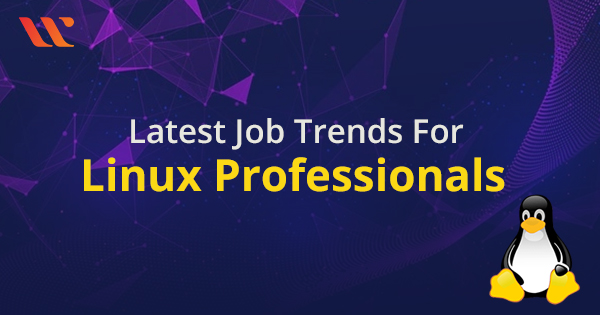Open source is the buzzword in the present IT industry. Linux is the forerunner of the open-source technologies that we use today, with Linux certification being one of the top IT certifications. Ubuntu is one of the top Linux distributions which is presently the highest used distribution. Ubuntu is the best OS for programming due to many reasons. The following discussion would outline seven distinct reasons for validating this fact.
Ubuntu is available in three different editions such as Desktop, Core, and Server versions. The Core edition is for IoT devices and robots. The developer of Ubuntu is Canonical and the founder, Mark Shuttleworth, might have never imagined the popularity Ubuntu gets now. Ubuntu gets a new release every six months, and Long-Term Support (LTS) releases in every two years. Canonical gives security updates and support with each Ubuntu release.
Must Read: Top 5 Linux Certifications
Why Ubuntu is the best OS for Programming?
After reflecting on the basic impression of Ubuntu, let us find out reasons for which it is the best OS for developers. The following discussion would reflect on the various reasons for which Ubuntu is the best OS for programming.
1. Support for Emerging Technologies
Ubuntu is the best Linux distro for developers for many reasons. The first reason relates to the support for different emerging technologies such as deep learning, artificial intelligence, and machine learning. Deep learning is radically growing with large scale investments from Microsoft, Google, and Amazon. The tech giants are investing in the creation of dedicated tools for deep learning.
Ubuntu is the best OS for developers because of the various libraries, examples, and tutorials. These features of ubuntu help considerably with AI, ML, and DL, unlike any other OS. Furthermore, Ubuntu also provides reasonable support for the latest versions of free open source software and platforms. Therefore, Ubuntu is the first choice for many renowned frameworks such as Keras, OpenCV, PyTorch, TensorFlow, and Theano.
Another reason to consider Ubuntu as the best OS for programming is the support for AI. GPUs are responsible for many contemporary changes in the AI landscape. Presently, NVIDIA’s investments in CUDA on Linux aim at making the most of the capabilities of their latest graphics cards. Now, you can add graphics cards to Ubuntu by using conventional PCI slots on motherboards or through external Thunderbolt adapters.
As a result, developers can add an array of hardware with higher processing capacity to small laptops. Also, developers could add high processing capacity hardware to larger rack-mounted form factors. You can also find Ubuntu as the best Linux distro for programming due to Kubeflow. Canonical developed Kubeflow in collaboration with Google.
Kubeflow is a reliable solution for the rapid creation of machine learning stacks with ease of composition, scalability, and portability. The most interesting highlight of Kubeflow is the simplification and speed of the process for the installation of AI tools and frameworks. Furthermore, Kubeflow also helps in easing the process of using GPGPUs from the house of NVIDIA.
Kubeflow in Ubuntu removes the most formidable barrier for the adoption of machine learning tools, i.e., the creation of production-ready stacks. Now, developers could bypass this obstacle with the help of Ubuntu. Deep learning is gaining recognition in many industries with diverse applications — for example, understanding genetic code or identifying financial fraud in real-time.
Many similar projects use Ubuntu as the foundation thereby validating it as the best Linux distro for developers. One of the notable instances of Ubuntu’s application in deep learning is in the autonomous car sector. Ubuntu is the major support provider for efforts from NVIDIA, Samsung, Baidu, and Intel.
Linux is no doubt, one of the top operating systems. Get yourself familiar with the latest Linux trends to have a bright Linux career.
2. Access to Certified Hardware
The next factor in finding out which OS is best for programming relates to hardware certification. Canonical partners with major hardware partners all over the world for providing Ubuntu with pre-loaded and pre-tested features. So, developers could be able to choose from multiple PC configurations to use Ubuntu. Major desktop and laptop manufacturers such as Lenovo, Dell, and HP provide systems tested for Ubuntu.
Also, Ubuntu assures certified hardware that complies with the needs of organizations in different sectors. Therefore, Ubuntu is the best OS for programming uses in the different sectors such as enterprise, education, public, and government sectors. The certified devices provide notable benefits such as tight integration with BIOS, factory-level quality assurance standards, and full support. Furthermore, certified devices also have credibility at the component level and board level.
3. Consistent OS Experience
Another reason to consider Ubuntu as the best OS for programming is the consistency of OS experience on different platforms. One of the best features of Ubuntu operating system is the access to the same software packages on all Ubuntu versions. Developers could switch between various platforms easily in a particular project without any issues. As a result, developers could be able to test applications locally before global deployment.
This can help developers move from development to production flexibly. The Ubuntu Desktop and Ubuntu Server versions provide a desktop environment similar to the server environment. The consistent OS experience helps in faster iteration on the AI model, thereby providing better time savings. IoT developers can use Ubuntu Desktop tools for creating and debugging software quickly before deploying them on IoT hardware. The uniform OS experience across different environments is ideal for effective integration between systems.
Preparing for a Linux Interview? Get through these Top Linux Interview Questions and get ready to ace the interview.
4. Advantage of Streamlined Distribution
The second reason for considering Ubuntu as the best OS for programming is the facility of streamlined distribution. Snaps are the ideal feature on Ubuntu for packaging and distribution of applications. These are the containerized applications which are compatible with desktops, IoT devices, and the cloud. Snaps provide explicit simplicity in creation and installation, safety in execution and automatic updates.
The packaging of snaps with all related dependencies makes them compatible with all notable Linux systems without any changes. Developers could create snaps through the Snapcraft command-line tool. The Snapcraft tool helps in simplification of the packaging work, which could have been complex otherwise. Snapcraft feature on Ubuntu makes it a clear winner on “which OS is best for programming.”
Developers could release new versions of applications to users and obtain crucial insights on the user base with Snapcraft. For example, research by Canonical estimates that around 69% of customers do not update connected devices manually. Therefore, developers could find that automatic updates are mandatory for the security of users and keeping them updated. As a result of the automation, developers could ensure a feasible customer experience.
Also, developers do not have to support older versions of products. The automatic update facility on Snap helps in reducing maintenance requirements for software vendors. Software vendors do not have to deal with the management of support requests since the entire user base could be moved to the new version without any obstacles. Ubuntu’s Snap feature makes it the best Linux distro for programming as it can also find applications with web-based services.
Web-based services with massive user base such as Slack or Skype could update to the current version without user inconvenience. The Snap Store is another feature on Ubuntu that helps developers in releasing free or paid apps. Developers need to publish the snap, and then they can release apps for multiple distributions or architectures in a single place.
Developers can also release apps on various channels such as edge, stable, candidate, and beta. The different channels provide ease of evaluating changes on a large scale. How? Developers can provide access to new features for users in less stable releases for testing the changes. Most important of all, Ubuntu is the best OS for programming because it has default Snap Store. As a result, developers could reach a wider audience with their apps easily.
Also Read: Top 10 Linux Influencers
5. Massive Support
The next entry among reasons to choose Ubuntu as a suitable OS for programming relates to the available support. Developers can find the features of Ubuntu operating system for stability, continuous updates, and security. Canonical provides Long-Term Support releases of Ubuntu at an interval of five years. Developers can find security updates, hardware support, and critical bug fixes in these long-term support releases.
The hardware support is critical to ensure compatibility of the latest hardware and processors with Ubuntu. LTS releases also provide the chance to publish a downloadable image with the necessary security and performance fixes in place. Therefore, developers do not have to worry about speed after installation of the Ubuntu LTS releases. The Canonical Livepatch service helps Ubuntu users for application of critical kernel security fixes without rebooting the system.
As a result, downtime is reduced considerably alongside taking care of security and compliance. The massive developer and application ecosystem of Ubuntu further strengthen its claim as a suitable OS for programming. Developers can find different forums dealing with various issues and discussions on technology and software development. The Ubuntu community is a great source to obtain information and is quite a welcome place for anyone.
The commercial support package Ubuntu Advantage provided by Canonical is also a vital source to improvise Ubuntu deployments. Ubuntu Advantage involves round the clock support over the phone and web from experts at Canonical. Also, developers get exclusive access to the alternative of a dedicated service engineer. Most important of all, the world-class Knowledge Base with Ubuntu Advantage cannot be neglected so easily.
Also Read: Best Linux Certification Preparation Books
6. Upgrade Hardware without Any Restrictions
The flexibility of selecting hardware and software with Ubuntu is another reason to classify it as the best OS for programming. Ubuntu Desktop involves contributions from the Ubuntu community, the whole Linux ecosystem, and commercial vendors. Ubuntu provides unbelievable hardware support across the board. The efforts of the team of engineers at Canonical for testing and certifying every level of the device stack are commendable.
The focus of the team lies on display adapters, power management, input devices, audio, storage devices, Bluetooth, and others. Therefore, Ubuntu does not impose any restrictions on users to upgrade their hardware. As a result, companies having specific hardware requirements and diverse hardware infrastructures can make the most of Ubuntu. Developers could also receive a huge library of software development tools which are updated constantly. The libraries are always updated with new tools due to the regular release model of Ubuntu.
Developers also get many programming language compilers, toolchains, and integrated development environments (IDEs) with Ubuntu OS. As a result, developers could target different environments, such as ARM, s390x, Intel, Power, and other environments. The benefits of Ubuntu for developers result in a reduction of time invested in addressing compatibility issues. The flexibility on Ubuntu is also essential for reducing friction and speed up the development process.
7. Appealing User Interface
The clean user interface on Ubuntu also validates its reputation as the best OS for programming. The user interface on Ubuntu presents a unique look as compared to other Linux distributions. As a result, Ubuntu does not have the downsides that are in the user interfaces of other Linux distributions. Gnome Shell is the basis of the Ubuntu user interface. However, Ubuntu has a reasonable improvement in the form of an easy to understand and user-friendly interface. Ubuntu does not confuse users with the standard Gnome look in its interface.
Linux Blogs are good source to learn about the latest Linux news, updates, trends, strategies, etc. Here is the list of 20 best Linux Blogs and websites!
Final Words
Based on the above discussion, Ubuntu could be the most suitable OS for developers. The discussion presented credible reasons to validate this fact. The first reason is observed in support of Ubuntu for machine learning, artificial intelligence, and deep learning. The next reason in the discussion shows the importance of streamlined distribution on Ubuntu for developers. The discussion highlighted the certified hardware as a benefit of Ubuntu OS for developers.
The most crucial reason to choose Ubuntu is the consistent OS experience across various platforms. The next factor in proving the potential of Ubuntu OS for developers relates to the facility of support. The other reasons for choosing Ubuntu include flexibility of upgrading hardware and an appealing user-interface. So, now you can trust Ubuntu as the best OS for development and programming!
If you are a Linux professional preparing for Linux certification, check out our Linux certifications training courses. A certification will help you validate your expertise and get ahead towards a bright future!
- Top 20 Questions To Prepare For Certified Kubernetes Administrator Exam - August 16, 2024
- 10 AWS Services to Master for the AWS Developer Associate Exam - August 14, 2024
- Exam Tips for AWS Machine Learning Specialty Certification - August 7, 2024
- Best 15+ AWS Developer Associate hands-on labs in 2024 - July 24, 2024
- Containers vs Virtual Machines: Differences You Should Know - June 24, 2024
- Databricks Launched World’s Most Capable Large Language Model (LLM) - April 26, 2024
- What are the storage options available in Microsoft Azure? - March 14, 2024
- User’s Guide to Getting Started with Google Kubernetes Engine - March 1, 2024




